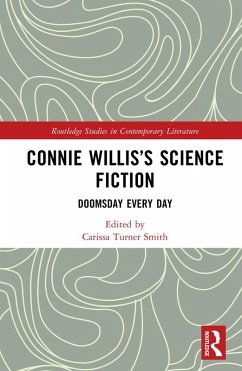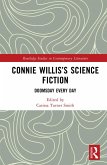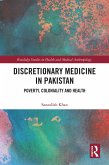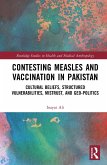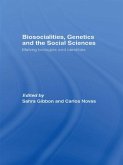Connie Willis's Science Fiction (eBook, ePUB)
Doomsday Every Day
Redaktion: Turner Smith, Carissa
42,95 €
42,95 €
inkl. MwSt.
Sofort per Download lieferbar

21 °P sammeln
42,95 €
Als Download kaufen

42,95 €
inkl. MwSt.
Sofort per Download lieferbar

21 °P sammeln
Jetzt verschenken
Alle Infos zum eBook verschenken
42,95 €
inkl. MwSt.
Sofort per Download lieferbar
Alle Infos zum eBook verschenken

21 °P sammeln
Connie Willis's Science Fiction (eBook, ePUB)
Doomsday Every Day
Redaktion: Turner Smith, Carissa
- Format: ePub
- Merkliste
- Auf die Merkliste
- Bewerten Bewerten
- Teilen
- Produkt teilen
- Produkterinnerung
- Produkterinnerung

Bitte loggen Sie sich zunächst in Ihr Kundenkonto ein oder registrieren Sie sich bei
bücher.de, um das eBook-Abo tolino select nutzen zu können.
Hier können Sie sich einloggen
Hier können Sie sich einloggen
Sie sind bereits eingeloggt. Klicken Sie auf 2. tolino select Abo, um fortzufahren.

Bitte loggen Sie sich zunächst in Ihr Kundenkonto ein oder registrieren Sie sich bei bücher.de, um das eBook-Abo tolino select nutzen zu können.
This collection argues that Connie Willis's oeuvre performs science fiction's task of cognitive estrangement by highlighting by highlighting our human inability to read the times correctly-and yet also affirming the ethical imperative to attempt to truly observe and record our temporal location
- Geräte: eReader
- mit Kopierschutz
- eBook Hilfe
Andere Kunden interessierten sich auch für
![Connie Willis's Science Fiction (eBook, PDF) Connie Willis's Science Fiction (eBook, PDF)]() Connie Willis's Science Fiction (eBook, PDF)42,95 €
Connie Willis's Science Fiction (eBook, PDF)42,95 €![Discretionary Medicine in Pakistan (eBook, ePUB) Discretionary Medicine in Pakistan (eBook, ePUB)]() Sanaullah KhanDiscretionary Medicine in Pakistan (eBook, ePUB)42,95 €
Sanaullah KhanDiscretionary Medicine in Pakistan (eBook, ePUB)42,95 €![Rural Disease Knowledge (eBook, ePUB) Rural Disease Knowledge (eBook, ePUB)]() Rural Disease Knowledge (eBook, ePUB)42,95 €
Rural Disease Knowledge (eBook, ePUB)42,95 €![Contesting Measles and Vaccination in Pakistan (eBook, ePUB) Contesting Measles and Vaccination in Pakistan (eBook, ePUB)]() Inayat AliContesting Measles and Vaccination in Pakistan (eBook, ePUB)42,95 €
Inayat AliContesting Measles and Vaccination in Pakistan (eBook, ePUB)42,95 €![Haemophilia in Aotearoa New Zealand (eBook, ePUB) Haemophilia in Aotearoa New Zealand (eBook, ePUB)]() Julie ParkHaemophilia in Aotearoa New Zealand (eBook, ePUB)44,95 €
Julie ParkHaemophilia in Aotearoa New Zealand (eBook, ePUB)44,95 €![Eggonomics (eBook, ePUB) Eggonomics (eBook, ePUB)]() Diane M. ToberEggonomics (eBook, ePUB)17,95 €
Diane M. ToberEggonomics (eBook, ePUB)17,95 €![Biosocialities, Genetics and the Social Sciences (eBook, ePUB) Biosocialities, Genetics and the Social Sciences (eBook, ePUB)]() Biosocialities, Genetics and the Social Sciences (eBook, ePUB)42,95 €
Biosocialities, Genetics and the Social Sciences (eBook, ePUB)42,95 €-
-
-
This collection argues that Connie Willis's oeuvre performs science fiction's task of cognitive estrangement by highlighting by highlighting our human inability to read the times correctly-and yet also affirming the ethical imperative to attempt to truly observe and record our temporal location
Dieser Download kann aus rechtlichen Gründen nur mit Rechnungsadresse in A, B, BG, CY, CZ, D, DK, EW, E, FIN, F, GR, HR, H, IRL, I, LT, L, LR, M, NL, PL, P, R, S, SLO, SK ausgeliefert werden.
Produktdetails
- Produktdetails
- Verlag: Taylor & Francis
- Seitenzahl: 292
- Erscheinungstermin: 31. Oktober 2022
- Englisch
- ISBN-13: 9781000728453
- Artikelnr.: 65606419
- Verlag: Taylor & Francis
- Seitenzahl: 292
- Erscheinungstermin: 31. Oktober 2022
- Englisch
- ISBN-13: 9781000728453
- Artikelnr.: 65606419
- Herstellerkennzeichnung Die Herstellerinformationen sind derzeit nicht verfügbar.
Carissa Turner Smith is Professor of English and Writing Center Director at Charleston Southern University, where she teaches American literature. Her book Cyborg Saints: Religion and Posthumanism in Middle Grade and Young Adult Fiction was published by Routledge in 2020.
Introduction
PART I: Contagion
Chapter One: All This Has Happened Before, and All This Will Happen Again:
Doomsday Book and Recurring Pandemics
Joelle L. Renstrom
Chapter Two: Flip Passes: Interpreting Agency and Contagion in Bellwether
Jill Marie Treftz
PART II: Individual and Collective Trauma
Chapter Three: Emergency Unpreparedness: Responses to Disaster in Connie
Willis's Passage Matthew Newcomb
Chapter Four: Taking it Personally: Private Engagement with Public Trauma
from World War II to J.F.K.
Janet L. Bland
PART III: Incarnation and Embodiment
Chapter Five: "You Were Here All Along": Doomsday Book and the Bodies of
Christ
Chad Schrock
Chapter Six: Christmas Every Day: Incarnational Theology in Connie Willis's
"Inn" and "Epiphany"
Erin Newcomb
PART IV: Intertextuality
Chapter Seven: Bell Speech in John Donne, Richard Wilbur, and Connie
Willis's Doomsday Book
William Tate
Chapter Eight: Finding Love (and Truth?) in the Midst of Chaos: The
Influence of Dorothy L. Sayers's Detective Fiction on To Say Nothing of the
Dog
Christine A. Colón
PART V: Genre, Gender, and Xenophobia
Chapter Nine: The Mote in the Jester's Eye: Aspects of Race and Gender in
Connie Willis's Light Short Fiction
Sylvia Kelso
Chapter Ten: "Tell All the Truth but Tell it Slant": Rhetorical Humor in
Connie Willis's Short Fiction
Rosalyn Eves
PART VI: Humanist and Posthumanist Witness
Chapter Eleven: Messages in a Bottle: The Historian's Ethic in Connie
Willis's Quantum Universe
Kathryn N. McDaniel
Chapter Twelve: Schrödinger's Cathedrals: Humanist Memory and Posthumanist
Sacramentality in Connie Willis's Fiction
Carissa Turner Smith
PART I: Contagion
Chapter One: All This Has Happened Before, and All This Will Happen Again:
Doomsday Book and Recurring Pandemics
Joelle L. Renstrom
Chapter Two: Flip Passes: Interpreting Agency and Contagion in Bellwether
Jill Marie Treftz
PART II: Individual and Collective Trauma
Chapter Three: Emergency Unpreparedness: Responses to Disaster in Connie
Willis's Passage Matthew Newcomb
Chapter Four: Taking it Personally: Private Engagement with Public Trauma
from World War II to J.F.K.
Janet L. Bland
PART III: Incarnation and Embodiment
Chapter Five: "You Were Here All Along": Doomsday Book and the Bodies of
Christ
Chad Schrock
Chapter Six: Christmas Every Day: Incarnational Theology in Connie Willis's
"Inn" and "Epiphany"
Erin Newcomb
PART IV: Intertextuality
Chapter Seven: Bell Speech in John Donne, Richard Wilbur, and Connie
Willis's Doomsday Book
William Tate
Chapter Eight: Finding Love (and Truth?) in the Midst of Chaos: The
Influence of Dorothy L. Sayers's Detective Fiction on To Say Nothing of the
Dog
Christine A. Colón
PART V: Genre, Gender, and Xenophobia
Chapter Nine: The Mote in the Jester's Eye: Aspects of Race and Gender in
Connie Willis's Light Short Fiction
Sylvia Kelso
Chapter Ten: "Tell All the Truth but Tell it Slant": Rhetorical Humor in
Connie Willis's Short Fiction
Rosalyn Eves
PART VI: Humanist and Posthumanist Witness
Chapter Eleven: Messages in a Bottle: The Historian's Ethic in Connie
Willis's Quantum Universe
Kathryn N. McDaniel
Chapter Twelve: Schrödinger's Cathedrals: Humanist Memory and Posthumanist
Sacramentality in Connie Willis's Fiction
Carissa Turner Smith
Introduction
PART I: Contagion
Chapter One: All This Has Happened Before, and All This Will Happen Again:
Doomsday Book and Recurring Pandemics
Joelle L. Renstrom
Chapter Two: Flip Passes: Interpreting Agency and Contagion in Bellwether
Jill Marie Treftz
PART II: Individual and Collective Trauma
Chapter Three: Emergency Unpreparedness: Responses to Disaster in Connie
Willis's Passage Matthew Newcomb
Chapter Four: Taking it Personally: Private Engagement with Public Trauma
from World War II to J.F.K.
Janet L. Bland
PART III: Incarnation and Embodiment
Chapter Five: "You Were Here All Along": Doomsday Book and the Bodies of
Christ
Chad Schrock
Chapter Six: Christmas Every Day: Incarnational Theology in Connie Willis's
"Inn" and "Epiphany"
Erin Newcomb
PART IV: Intertextuality
Chapter Seven: Bell Speech in John Donne, Richard Wilbur, and Connie
Willis's Doomsday Book
William Tate
Chapter Eight: Finding Love (and Truth?) in the Midst of Chaos: The
Influence of Dorothy L. Sayers's Detective Fiction on To Say Nothing of the
Dog
Christine A. Colón
PART V: Genre, Gender, and Xenophobia
Chapter Nine: The Mote in the Jester's Eye: Aspects of Race and Gender in
Connie Willis's Light Short Fiction
Sylvia Kelso
Chapter Ten: "Tell All the Truth but Tell it Slant": Rhetorical Humor in
Connie Willis's Short Fiction
Rosalyn Eves
PART VI: Humanist and Posthumanist Witness
Chapter Eleven: Messages in a Bottle: The Historian's Ethic in Connie
Willis's Quantum Universe
Kathryn N. McDaniel
Chapter Twelve: Schrödinger's Cathedrals: Humanist Memory and Posthumanist
Sacramentality in Connie Willis's Fiction
Carissa Turner Smith
PART I: Contagion
Chapter One: All This Has Happened Before, and All This Will Happen Again:
Doomsday Book and Recurring Pandemics
Joelle L. Renstrom
Chapter Two: Flip Passes: Interpreting Agency and Contagion in Bellwether
Jill Marie Treftz
PART II: Individual and Collective Trauma
Chapter Three: Emergency Unpreparedness: Responses to Disaster in Connie
Willis's Passage Matthew Newcomb
Chapter Four: Taking it Personally: Private Engagement with Public Trauma
from World War II to J.F.K.
Janet L. Bland
PART III: Incarnation and Embodiment
Chapter Five: "You Were Here All Along": Doomsday Book and the Bodies of
Christ
Chad Schrock
Chapter Six: Christmas Every Day: Incarnational Theology in Connie Willis's
"Inn" and "Epiphany"
Erin Newcomb
PART IV: Intertextuality
Chapter Seven: Bell Speech in John Donne, Richard Wilbur, and Connie
Willis's Doomsday Book
William Tate
Chapter Eight: Finding Love (and Truth?) in the Midst of Chaos: The
Influence of Dorothy L. Sayers's Detective Fiction on To Say Nothing of the
Dog
Christine A. Colón
PART V: Genre, Gender, and Xenophobia
Chapter Nine: The Mote in the Jester's Eye: Aspects of Race and Gender in
Connie Willis's Light Short Fiction
Sylvia Kelso
Chapter Ten: "Tell All the Truth but Tell it Slant": Rhetorical Humor in
Connie Willis's Short Fiction
Rosalyn Eves
PART VI: Humanist and Posthumanist Witness
Chapter Eleven: Messages in a Bottle: The Historian's Ethic in Connie
Willis's Quantum Universe
Kathryn N. McDaniel
Chapter Twelve: Schrödinger's Cathedrals: Humanist Memory and Posthumanist
Sacramentality in Connie Willis's Fiction
Carissa Turner Smith
